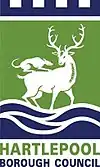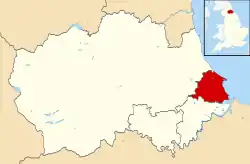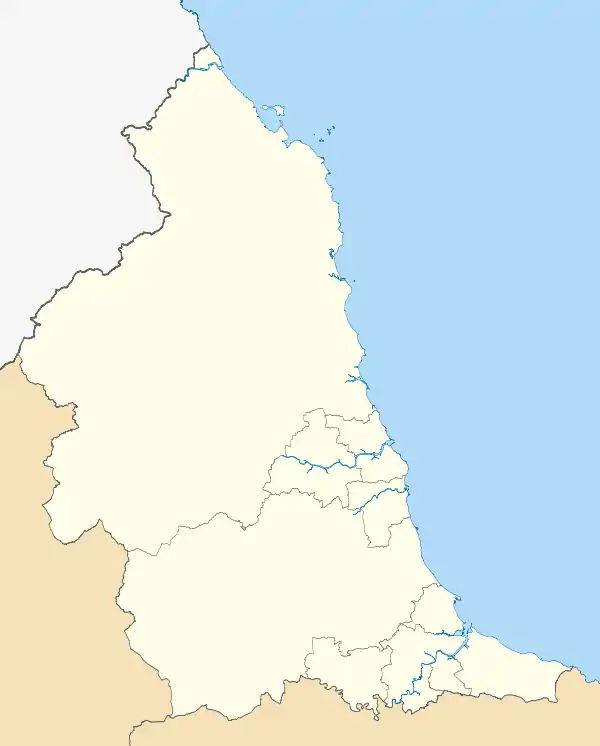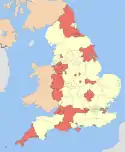Borough of Hartlepool
The Borough of Hartlepool is a unitary authority area in the ceremonial county of County Durham, in north-east England. It is centred on, and named after, the town of Hartlepool.
Borough of Hartlepool | |
|---|---|
unitary authority area, borough | |
 logo of the borough council | |
 Hartlepool within County Durham and England | |
| Sovereign state | United Kingdom |
| Constituent country | England |
| Region | North East England |
| City region | Tees Valley |
| Ceremonial county | County Durham |
| Admin. HQ | Hartlepool |
| Government | |
| • Type | Hartlepool Borough Council |
| • Leadership: | Council Leader |
| • Leader | Shane Robert Moore (Independent Union) |
| • Tees Valley Mayor | Ben Houchen |
| • MPs: | Mike Hill (L) |
| Area | |
| • Total | 36.12 sq mi (93.56 km2) |
| Area rank | 222nd |
| Population (mid-2019 est.) | |
| • Total | 93,663 |
| • Rank | Ranked 260th |
| • Density | 2,600/sq mi (1,000/km2) |
| Time zone | UTC+0 (Greenwich Mean Time) |
| • Summer (DST) | UTC+1 (British Summer Time) |
| ONS code | 00EB (ONS) E06000001 (GSS) |
| Ethnicity | 97.9% White 1.0% S.Asian (Census 2011) |
| Website | www.hartlepool.gov.uk |
In 2003 it had a resident population of 90,161, increasing to 92,028 at the 2011 Census.[1] It borders Stockton-on-Tees to the south and Redcar and Cleveland to the south-east along the line of the River Tees.
It is made up of 17 council wards and since the 1983 parliamentary redistribution is coterminous with the Hartlepool constituency. The local authority is Hartlepool Borough Council; the borough is a member of the Tees Valley combined authority.
History
After several unification efforts starting in 1902, the county borough of Hartlepool was formed in 1967 by the merger of the original borough of Hartlepool (the "Headland") with the county borough of West Hartlepool further south on Tees Bay, together with the parish of Seaton Carew to provide coastal land for industrial development.[2]
The district was formed on 1 April 1974, by the merger of the previous county borough of Hartlepool, along with the parishes of Brierton, Claxton, Dalton Piercy, Elwick, Elwick Hall, Greatham, Hart and Newton Bewley, from the Stockton Rural District, all of which had been part of the administrative county of Durham. It was one of the four districts of the non-metropolitan county of Cleveland.
Cleveland was abolished in 1996 after a review by the Banham Commission, with the four boroughs of Stockton-on-Tees, Hartlepool, Redcar & Cleveland and Middlesbrough becoming unitary authorities. For ceremonial purposes Hartlepool returned to County Durham, however it continues to share certain local services with the other former Cleveland boroughs, including the Cleveland Police and Cleveland Fire Brigade.
Elected mayor
Hartlepool was one of a small number of councils in the United Kingdom to have a directly elected mayor. This followed a referendum held in the borough in October 2001,[3] and the first mayoral election was held in May 2002. The election became famous for being won by the mascot of Hartlepool United F.C., 'H'Angus the Monkey',[4] with a majority of approximately 500 over the second-placed Labour Party candidate. The man inside the monkey costume, Stuart Drummond, served as mayor as an independent since then, being re-elected in 2005 with a majority of over 10,000[5] and again in 2009 with a second round majority of 844.
In November 2012 Hartlepool voted in a referendum to abolish the directly elected mayor and return to having the council leader model used by most English councils.[6] 7,366 voted against the directly elected mayor system, while 5,177 voted to retain it, on a turnout of 18%.[6]
Places in the borough
As well as Hartlepool, locations within the borough include:
Economy
This is a chart of trend of regional gross value added of Hartlepool and Stockton-on-Tees at current basic prices published (pp. 240–253) by Office for National Statistics with figures in millions of British Pounds Sterling.
| Year | Regional Gross Value Added[note 1] | Agriculture[note 2] | Industry[note 3] | Services[note 4] |
|---|---|---|---|---|
| 1995 | 2,804 | 9 | 1,443 | 1,352 |
| 2000 | 3,252 | 6 | 1,359 | 1,887 |
| 2003 | 3,364 | 6 | 1,037 | 2,320 |
- Notes
- Components may not sum to totals due to rounding
- includes hunting and forestry
- includes energy and construction
- includes financial intermediation services indirectly measured
References
- "Unitary Authority population 2011". Retrieved 2 February 2016.
- Hartlepool Order 1966 Commons debate and Lords debate
- Mark Sandford (March 2002). "Who wants an elected mayor? Lessons from the first wave". New Economy. Institute of Public Policy Research. 9 (1): 47–51. doi:10.1111/1468-0041.00239.
- BBC News (3 May 2002). "Monkey mascot elected mayor". Retrieved 14 March 2008.
- BBC News (6 May 2005). "Winning 'monkey' mayor gains wife". Retrieved 14 March 2008.
- Mulholland, Hélène (16 November 2012). "Mayor H'Angus the Monkey finally loses his Hartlepool habitat". The Guardian. London: 16 November 2012. Retrieved 17 November 2012.

